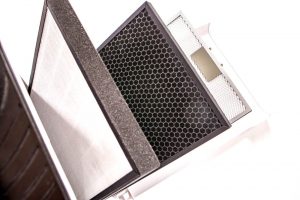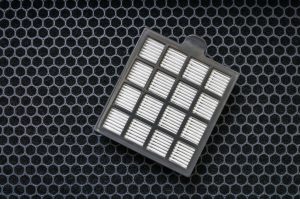If you have been researching air filters, you must have come across the term MERV rating. MERV rating means Minimum Efficiency Reporting Value.
In simple terms, this rating defines the ability of a filter to capture particles between 0.3 and 10 microns (µm). This rating goes from 1 to 20, with one being the least efficient and 20 being the most efficient being the most.
It was developed by a ASHRAE which is the American Society of Heating Refrigerating and Air-Conditioning Engineers.
To make it simpler, a filter with MERV rating of 16 will allow fewer particles to pass through as compared to a filter with rating 15 or below. These filters are tested for various particles such as dust mites, mould spores, textile fibres, tobacco smoke, bacteria, pet dander, pollen and others.
Contents
Key Takeaways
- MERV rating, or Minimum Efficiency Reporting Value, measures a filter’s ability to capture particles between 0.3 and 10 microns, with higher ratings indicating greater efficiency.
- Using a filter with a MERV rating higher than recommended for your heating or cooling system can strain the system, reduce airflow, and shorten its lifespan.
- HEPA filters have their own distinct rating system and are required to meet specific efficiency criteria, offering exceptional particle filtration at 99.97% efficiency for particles of 0.3 microns.
Is a Higher MERV Rating Better?
 It is intuitive to think that a higher MERV rating is always better, but that is certainly not the case. If you check the manual supplied by the manufacturer of your heating or cooling system, you will find that they recommend using filters up to a particular MERV rating.
It is intuitive to think that a higher MERV rating is always better, but that is certainly not the case. If you check the manual supplied by the manufacturer of your heating or cooling system, you will find that they recommend using filters up to a particular MERV rating.
If you are using a filter with higher than recommended MERV rating, it means that your HVAC system has to work harder to maintain the airflow. This is the reason, every heating and cooling system comes with recommended MERV rating for filters.
It would be best if you used the filters as specified by the manufacturer to make sure that your system keeps working at optimum efficiency.
If you choose a filter with a higher MERV rating, it will reduce the airflow and will put a lot of pressure on your system. You do not want that as it will reduce the service life of your AC or furnace system.
To give you an idea of the MERV rating of filters recommended for residential systems, you should know that filters with MERV rating of 7 to 12 are capable of adequately removing most of the airborne particles in a residential setting.
Air filters with MERV rating of 13 to 16 are typically used in hospitals.
Filters with MERV rating of 17 to 20 are recommended for use in clean rooms, surgical operating rooms as well as in situations where absolute cleanliness is needed.
What MERV Rating is a HEPA Filter?
 HEPA stands for High Energy Particulate Air. Many people get confused between HEPA and MERV ratings. HEPA filters are a category of their own, and they exceed the requirements of test protocol used for determining MERV ratings.
HEPA stands for High Energy Particulate Air. Many people get confused between HEPA and MERV ratings. HEPA filters are a category of their own, and they exceed the requirements of test protocol used for determining MERV ratings.
HEPA filters are required to meet a specific efficiency at a particular particle size. All the HEPA air filters are certified only when they meet the criteria of minimum efficiency of 99.97% at 0.3 microns (µm).
To explain it in simple language, if 100,000 particles of 0.3 micron size are directed at a HEPA filter, the filter will pass the test only if it allows a maximum of 30 particles to pass through which is how you get a 0.3 micron rating at 99.97% efficiency. In short, HEPA is entirely different from MERV.
What MERV Rating Should I Use?
All the air filters are designed to capture the airborne particles that can cause harm to people when inhaled. As far as using a filter with a particular MERV rating in a residential setting is concerned, you should always go by the manufacturer’s recommendations.
If you choose a filter with MERV rating higher than the recommended rating, it will put unnecessary strain on your heating and cooling system. Also, you will have to replace filters at a much faster rate.
It is also important to note that filters with higher MERV ratings are required to be replaced more frequently.
It is recommended to change filters with higher MERV ratings at least once every three months. The frequency could be higher depending on the MERV rating.
If you do not change the filters, it can potentially damage your system and make it inefficient. Therefore, check the manufacturer’s recommendations as this is the rating at which they have tested the system for optimum efficiency.
Heat Pump Source: Reliable Heating and Cooling Solutions
At Heat Pump Source, we take pride in our unwavering commitment to serving the UK with top-tier HVAC solutions. From the efficiency of heat pumps and the cool relief of air conditioning to the warmth of boilers, radiators, and underfloor heating, our dedicated team is always at the forefront of innovation. We understand the unique needs of every household and business, and we strive to provide dependable health and cooling products and services that are tailored just for you. Ensuring your comfort and satisfaction is our utmost priority. Whether you have questions, need guidance, or require support, we’re always here to assist. Please don’t hesitate to contact us; we’re eager to be of service.
Conclusion
Hopefully, you now know everything you wanted to know about MERV rating and how to go about choosing the appropriate MERV rating air filters.
About the Author
At Heat Pump Source, our articles are the product of a collaborative effort among a team of highly skilled HVAC experts. Our dedicated professionals, hailing from diverse backgrounds in heating, ventilation, air conditioning, and refrigeration, contribute their extensive knowledge and experience to every piece of content. This multidisciplinary approach ensures comprehensive coverage. Our commitment is to deliver authoritative, reliable, and tailored advice to meet the unique needs of every household and business across the UK.

